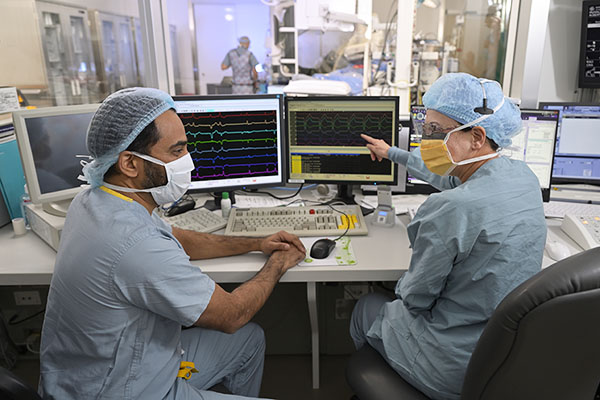
Atrial Fibrillation (AF) affects more than 2.9 million Americans. This heart-rhythm disorder is a very fast and disorganized heartbeat that often causes uncomfortable symptoms and can lead to stroke or heart failure.
AF can begin at any age, but it becomes more common as people grow older. Once thought to be a disease that could only be controlled, AF can now be cured in many patients, particularly if treated early.
Philosophy of Care
The Center for Atrial Fibrillation's innovative approach is patient focused, bringing highly trained specialists together to address the unique needs of our patients with AF. The team includes Board Certified physicians in Cardiology, Electrophysiology, and Cardiovascular/Thoracic Surgery.
The team discusses each patient and makes recommendations based on best practices and evidence-based guidelines. A comprehensive and individualized approach to the treatment of AF includes communication and coordination with the patient's primary care physician.
Established as a service in 2008, the Center for Atrial Fibrillation is an extension of the continuum of care provided by Penn Heart and Vascular Chester County Hospital.
Four Tools to Manage Atrial Fibrillation
There are several identified benefits to treating atrial fibrillation. There is the opportunity for improved quality of life and an increased activity level. The patient could see a reduction in the need for medication, as well as lower the risk of stroke and heart failure.
1). MEDICATIONS
Initially, medications are used to treat AF. The medications may include:
- Blood Thinning or Anti-Coagulation Medication
- Rate Control Medication
- Rhythm Control or Anti-Arrhythmic Medication
2). CARDIOVERSION
A mainstay of treatment in which an electric current is delivered to the heart while the patient is sedated. In many cases, this will restore normal heart rhythm.
3). DEVICE THERAPY
Though not everyone with AF needs an implantable device, there are many reasons one may be recommended for you.
- Pacemaker: A small device implanted under the skin, which sends electrical impulses to the heart to maintain a stable heart rate. Implantable Cardioverter
- Defibrillator (ICD): Though implanted for more dangerous heart rhythms such as ventricular fibrillation, an ICD can also be programmed to treat and reduce episodes of AF.
4). ABLATION
Ablation uses an energy source to create areas of scar tissue on the inside or outside of the heart. Because abnormal electrical signals cannot pass through scar tissue, the irregular signals stop and in many cases, normal rhythm returns. This procedure may reduce the number of medications needed. AF ablation is the newest addition to the spectrum of complex ablations that are provided by the Electrophysiology Program at Chester County Hospital. There are two approaches to ablating AF - catheter and surgical. Both have the same goal, to block the electrical impulses responsible for AF.
- Catheter Ablation: In this non-surgical procedure, wires are threaded through blood vessels to the heart. The multiple origins of AF are identified and isolated using an energy source to create lines of block.
- Surgical Ablation - Stand-alone: Patients who are not candidates for catheter ablation may decide on this approach. It is a surgical procedure that creates lines of block to redirect electrical signals, thus reducing or preventing AF.
- Surgical Ablation - Concomitant: An innovative approach available to patients who need heart surgery and who also suffer from AF. The ablation is performed during the heart surgery thereby eliminating a second procedure.
LOCATION and CONTACT INFORMATION
Chester County Hospital
701 East Marshall Street
West Chester, PA 19380
Phone: 1-866-218-6636
|